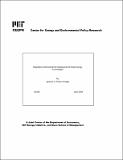| dc.contributor.author | Pérez-Arriaga, Ignacio J. | |
| dc.date.accessioned | 2010-02-11T16:51:25Z | |
| dc.date.available | 2010-02-11T16:51:25Z | |
| dc.date.issued | 2009-07 | |
| dc.identifier.other | 2009-009 | |
| dc.identifier.uri | http://hdl.handle.net/1721.1/51706 | |
| dc.description.abstract | Answering to the formidable challenge of climate change calls for a quick transition to a future economy with a drastic reduction in GHG emissions. And this in turn requires the development and massive deployment of new low-carbon energy technologies as soon as possible. Although many of these technologies have been identified, the critical issue is how to make them happen at the global level, possibly by integrating this effort into a global climate regime. This paper discusses the preferred approaches to foster low-carbon energy technologies from a regulatory point of view. Specific promotion policies for energy efficiency and conservation, renewable energy, carbon capture and sequestration, and nuclear power are examined, but the focus is on the regulatory instruments that will be needed for the deployment of enhancements to electricity grids and the associated control systems so that they are able to integrate intelligent demand response, distributed generation and storage in an efficient, reliable & environmentally responsible manner. The paper also comments on the interactions between technology and climate change policies and provides recommendations for policy makers. | en |
| dc.description.sponsorship | Massachusetts Institute of Technology. Center for Energy and Environmental Policy Research. | en |
| dc.language.iso | en_US | en |
| dc.publisher | MIT Center for Energy and Environmental Policy Research | en |
| dc.relation.ispartofseries | MIT-CEEPR (Series);2009-009 | |
| dc.title | Regulatory Instruments for Deployment of Clean Energy Technologies | en |
| dc.type | Working Paper | en |
